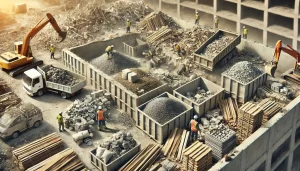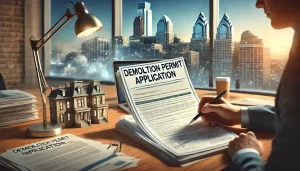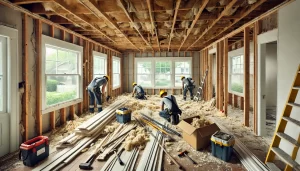If you’re considering a demolition project on your Ohio property, local zoning laws and ordinances will significantly shape what you can and cannot tear down. Navigating the intricate zoning regulations takes extensive research as well as close collaboration with your municipal zoning department. This comprehensive guide will thoroughly examine zoning’s multifaceted role in demolition permitting and approval processes in Ohio:
Defining the Highly Complex World of Zoning Regulations
At its core, zoning refers to municipal and county legal codes dictating how property owners can legally use or develop private land parcels and buildings. Zoning ordinances aim to promote public health, safety, infrastructure efficiency, and general welfare, placing restrictions and permitting requirements on several key areas:
- Building size limits, maximum height allowances, and density quotas based on lot square footage
- Lot specifications from minimum frontage widths to acreage thresholds
- Setback buffers required from property boundary lines and rights of way
- Allowed structure types, uses, and dimensions by zone
Ohio zoning laws grant zoning boards and departments significant oversight and enforcement powers to regulate local development patterns.
Zone Classifications and Detailed Land Use Tables
Zoning codes divide communities into different land use zone districts—residential, commercial, industrial, recreational, institutional, agricultural, etc. The classifications thoughtfully promote compatibility and logical neighborhood flow by separating incompatible developments and uses from mixing.
What property owners may legally demolish, rebuild, or newly construct becomes dictated by the specific permissible use tables and dimensional standards embedded within zoning codes per district. For example, industrial-zoned lots limit single-family homes and religious centers.
Ohioans proposing tear-downs followed by substantially larger rebuilds than existing degraded structures get subjected to heightened zoning reviews. Added inspections ensure appropriate in-scale development, preventing outsized buildings from harming neighborhood aesthetics and continuity.
Nonconforming Uses Further Complicate Efforts
Pre-existing structures that are now non-adherent with recently updated zoning rules are deemed legal nonconforming buildings. While allowed to remain, nonconformities operate under heavy restrictions moving forward. This includes once-allowed commercial uses that are now prohibited from operating in residential zones due to neighborhood evolution.
Zoning severely restricts expanding nonconformities, and full demolition/redevelopment plans face acute limitations under noncompliance status as well. Zoning boards rarely grant variances for owners seeking special permission to depart from regulations.
Two Primary Zoning Influences on Demolition Projects
Zoning laws significantly impact demolition initiatives in two overarching ways, spanning permitting limitations to rebuilding constraints:
Demolition Permits Now Required First
Tearing down any structures—whether due to extreme age, problematic structural degradation, or deliberate rebuilding plans—requires first obtaining municipal demolition permits per Ohio’s stringent zoning governance. This allows staff to thoroughly inspect electrical, gas, and water line caps, project waste containment plans, and site erosion controls before granting approvals.
Rebuilding Limitations by District
What property owners hope to construct after demolition matters greatly zoning-wise, too. Any notable structure changes from the original site plan require zoning reviews based on current use permissions—especially substantially larger rebuilds. Successfully securing necessary approvals often requires formally amending the existing zoning allowances through variance requests.
Common Reasons for Demolition Delays or Denials
While most standard demolition projects earn permits after nominal zoning reviews in Ohio, boards maintain the authority to impose delays or rejections based on details not meeting codes. Common reasons include:
Historic Designations – Demolishing structures deemed historically or culturally significant—whether updated architecture or sites where significant public events occurred—prompts heightened scrutiny. Numerous zoning hearings typically precede approvals or denials.
Use Change Attempts – Seeking residential to commercial/industrial use changes via demolition encounters obstacles without zone amendments first. Zoning prohibits conflicting uses by mapped areas.
Safety or Health Issues – Negligent demolition plans get rejected, including unaddressed contamination, poor utility cutoffs, inadequate debris containment during tear down threatening public welfare, etc.
Pre-existing Violations – Unresolved matters like code violations, unpaid fines, or lack of property maintenance provide bases for zoning officials to delay or deny demolition permits until addressed properly.
Consulting zoning early is key for coherent navigations later.
Navigating Zoning Ordinance Review Boards
For major demolition projects or substantial rebuilds warranting closer municipal inspection, local zoning review boards thoroughly assess proposals across multiple meetings:
Application Filed – Owners submit zoning permit applications with regulations-stipulated details—site plans, debris disposal methods, post-demo rebuild goals, etc.
Departmental Review – Zoning departments thoroughly vet application materials and then schedule public board reviews if criteria are met, like use changes sought, code deviations requested, etc. Community development staff often conduct site visits during this underwriting phase as well.
Owner Public Presentations – At board meetings, property owners present overall demolition and reconstruction plans and then address officials’ questions, plus public feedback.
Proposal Refinements – Owners revise plans as needed per board recommendations and provide any additional documents requested.
Final Determinations – The zoning review board votes to approve the permit outright or conditionally, deny the full application, or delay the final decision pending further evaluations or demolition/rebuild plan adjustments.
Early pre-consultations with zoning officials help streamline eventual permit approvals for demolition projects facing this intensive board review process.
For trusted guidance in adherence to complex zoning laws for your next demolition project in Ohio, contact Bella Contracting Services. Its extensive hands-on demolition experience facilitates the navigation of complex zoning compliance processes from permitting through to debris removal.





